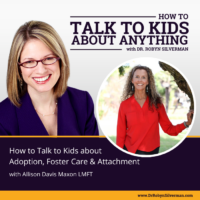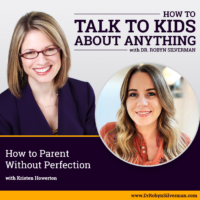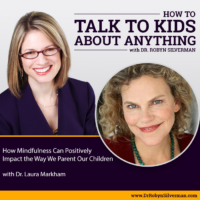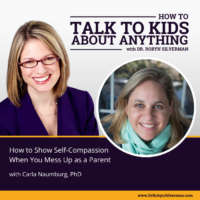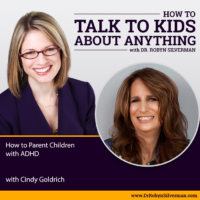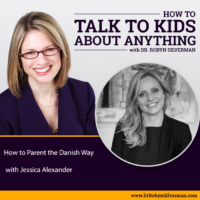Podcast: Play in new window | Download
Subscribe: Apple Podcasts | RSS | More
How to Parent with Intention
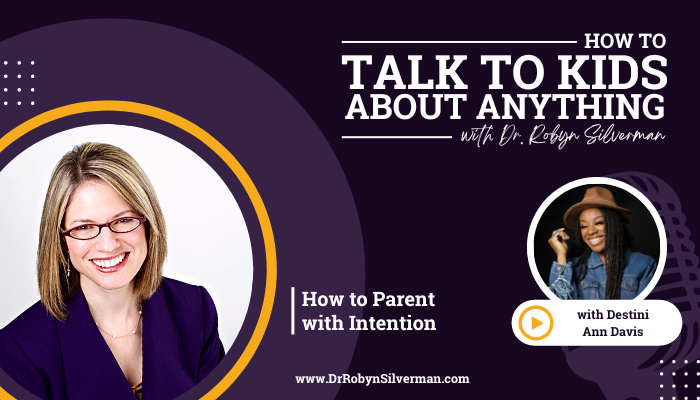
This podcast focuses on talking to kids about ignoring it when siblings are driving them nuts. We will be discussing how to deal with siblings who annoy, pester, bully or fight using the “Ignore It!” system developed by Catherine Pearlman.
Special Guest: Destini Ann Davis
How to Parent with Intention
This podcast will focus on how to parent with intention while keeping your top values in mind.
Many of us find ourselves tied up in knots somewhere along the path of parenting. This is a tough job—and we’re the ones who are charged to do it! Many of us have turned to parenting books, podcasts and experts to try to piece together the best parenting practices for us. This is not one-size fits all since no two children are the same. Sometimes, what we’ve been told to do isn’t right for our kid- and we need to look into non-traditional parenting approaches to help our children thrive and survive—and help us to keep our wits about ourselves while we are doing it. You might have heard some terms making their rounds like gentle parenting, conscious parenting, positive parenting and intentional parenting—but what does it all mean and how can it help both kids and parents deal with the day-to-day challenges in our homes? For this, we turn to our guest, Destini Ann Davis.
Important Messages:
- It’s important to make your home a safe place for expression and individual behavior.
- As a child, living in fear of being physically punished- now there is so much trauma and damage—and there is still so much residue. “There was, and still is so much trauma and damage…and there’s still residue of it, but it was very evident in my relationships and my interpersonal skills and my communication. Being able to regulate all of those things are things I have to work on daily. And the only reason that I am intentional about them, I promise you, is because I have small people that model my behaviors, that hold me accountable, that I have to show up for every day.”
- Determining values: (1) “The biggest question to ask when trying to determine your values is, first of all, ‘am I modeling this?’ And if so, it’s truly a value. And if not, it’s, it’s an aspiration.” (2) Where is this coming from? And if it’s coming from a place of fear or people pleasing or, growing up in a time where urgency you had to be or there was going to be a consequence, asking yourself, what does this, not necessarily getting rid of the value, but asking yourself, what does this value actually need to look like in a way that I can feel safe and show safety to my children?
- Your family values have nothing to do with the neighbor’s family values or anyone else’s. What feels right for you?
- Why is this a value for you? I thought I valued gentleness and meakness at one point—so when my child was being sassy and fiery, I reacted in a negative way and told her she was being rude. But this is not because I valued meakness—but because this behavior was shut down for me when I was growing up. “What comes up for you when your child exhibits a behavior that is opposite what you state is one of your values? You may realize that a certain value isn’t a value because it’s who I am, or because I actually genuinely think that it’s important. This was my value because when I was being the opposite as a child, it got shut down.”
- Are you upholding the values you claim are important to you? For me, my value, one of my biggest values is freedom. And I’ll get in seasons where I just start to be very controlling of just what they’re saying, what they’re wearing. And when I recognize that, my first question is, well, why am I being that way? And where is my sense of free freedom being controlled and how are my needs around that value not being met? And how am I actually feeling that about that? And how is it showing up? And oftentimes I find that when we are out of alignment with our values when it comes to our kids, it’s because we’re not actually upholding those values for ourselves and in our relationships and in our experiences.
- Empathy: Empathy is one of the number one things that a lot of us did not get as children. So again, not trying to fix it, but just peel it back and showing what, what it really is. What’s underneath? For me, a lot of times what’s underneath that is the emotion of shame and grief.
- Reparenting: Let’s say, you’re trying to rush things. Why? You’re trying to check all the boxes because you don’t feel like a good parent. And there’s a lot of grief around there because you’re a single parent and you’re worried about how that’s gonna look and you’re projecting and all of this stuff that has nothing to do with rushing them out of the door. And just being able to sit with that, seeing how it’s impacting the moment and just holding space for that. And that, that may sound weird, but the more that you do that, you’re like, Wow, this would’ve been really nice to just have somebody allow me to get it out. And doing that for myself is probably the biggest part of reparenting for me, because I’m able to heal it the more that it’s revealed, you know?
- What to say: “I’m right here, or how can I support you?”
- What not to say: “Stop that [behavior].”
- What to say: “We can figure this out.”
- Use lightheartedness to lighten the situation.
- What to say: Tell your child what you are willing to do and what you are not willing to do. “And I’m here if you get upset.” (Boundary setting)
- Don’t say: “You’re being manipulative.”
- Don’t say: You have to eat this food you don’t like.
- Do say: “Eat what you can.”
- Technique: Remember—you wouldn’t say these things to a 35-year-old person! “You have to eat that!” So why say it to your child?
- Triggers: (1) Know them. (2) Plan for them. (3) Be quiet! Don’t say anything while triggered.
- “Logical me” vs “emotional me” in soundproof rooms. Just walk into the logical room!
- Name things. “I am stressed.” “I am annoyed.” Acknowledging why and where it’s coming from. I would say it’s probably like 60% of the battle, honestly.
- Recognizing where it feels in my body. What calms our body?
- When you think of your child as an adult for a moment, it can help you get perspective—we can relate to adults and what it means to have a hard day and the last straw. And then we can realize that our child may feel like that—but with something that is relative to them. It seems minor to you (they stepped on a cheerio) but it feels major to them. “It’s true for them.”
- Family meetings can be really helpful for collaboration.
- Use observations instead of judgments. Name what you see.
- Remember- you are the expert in your child. Just pause and give yourself the opportunity to grab a tool to use.
Notable Quotables:
- With regard to how she turned out so well, despite being physically punished and fearful of physical punishment in her childhood home: “There was, and still is so much trauma and damage…and there’s still residue of it, but it was very evident in my relationships and my interpersonal skills and my communication. Being able to regulate all of those things are things I have to work on daily. And the only reason that I am intentional about them, I promise you, is because I have small people that model my behaviors, that hold me accountable, that I have to show up for every day.”
- “The start of intentional parenting is knowing who you are, where you wanna go and what you value.”
- “The biggest question to ask when trying to determine your values is, first of all, ‘am I modeling this?’ And if so, it’s truly a value. And if not, it’s, it’s an aspiration.”
- “What comes up for you when your child exhibits a behavior that is opposite what you state is one of your values? You may realize that a certain value isn’t a value because it’s who I am, or because I actually genuinely think that it’s important. This was my value because when I was being the opposite as a child, it got shut down.”
- “Lead with curiosity before jumping in to fix your child’s behavior.”
- “Empathy is one of the number one things that a lot of us did not get as children. So again, we’re not trying to fix it, but just peel it back and show what, what it really is. What’s underneath? For me, a lot of times what’s underneath that is the emotion of shame and grief.”
- “Let’s say, you’re trying to rush things. Why? You’re trying to check all the boxes because you don’t feel like a good parent. And there’s a lot of grief around there because…you’re worried about how that’s gonna look and you’re projecting and all of this stuff that has nothing to do with rushing them out of the door. And just being able to sit with that, seeing how it’s impacting the moment and just holding space for that. The more that you do that, you’re like, ‘Wow, this would’ve been really nice to just have somebody allow me to get it out.’ And doing that for myself is probably the biggest part of reparenting for me, because I’m able to heal it the more that it’s revealed.”
- “Step into their world and validate what they are saying. ‘That makes sense’ is one of the most powerful phrases I use.”
- “Pause, reflect and set an intention.”
Destini Ann Davis reminds us on #talktokids podcast this week to pause, reflect and set an intention as a parent. Listen in on how it’s done!
Click To Tweet
Lead with curiosity before jumping in to fix your child’s behavior, says Destini Ann Davis on #talktokids podcast. Listen in here–>
Click To Tweet
Resources:
The post How to Parent with Intention with Destini Ann Davis appeared first on drrobynsilverman.com.

